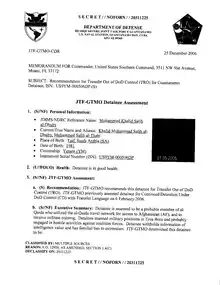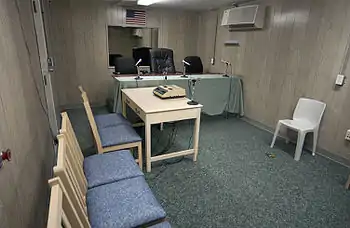Khalid Mohammed Salih Al Dhuby
Khalid Mohammed Salih Al Dhuby is a citizen of Yemen, who was held in extrajudicial detention in the United States's Guantanamo Bay detention camps, in Cuba for almost fourteen years.[1] His Guantanamo Internee Security Number is 506. American intelligence analysts estimate that Al Dhuby was born in 1981, in Ta'if, Saudi Arabia.
| Khalid Mohammed Salih Al Dhuby | |
|---|---|
 | |
| Released | 2016-01-17 Ghana |
| Detained at | Guantanamo |
| ISN | 506 |
| Charge(s) | No charge, held in extrajudicial detention |
| Status | transferred to Ghana in January 2016 |
He was first recommended for release in 2006.[2] He was transferred to Ghana with fellow Yemeni Mahmoud Omar Mohammed Bin Atef on January 7, 2016.[3] The pair were the first individuals to be transferred to a sub-Saharan nation of which they were not a citizen.
Official status reviews
Originally the Bush Presidency asserted that captives apprehended in the "war on terror" were not covered by the Geneva Conventions, and could be held indefinitely, without charge, and without an open and transparent review of the justifications for their detention.[4] In 2004 the United States Supreme Court ruled, in Rasul v. Bush, that Guantanamo captives were entitled to being informed of the allegations justifying their detention, and were entitled to try to refute them.
Office for the Administrative Review of Detained Enemy Combatants

Following the Supreme Court's ruling the Department of Defense set up the Office for the Administrative Review of Detained Enemy Combatants.[4][7]
Scholars at the Brookings Institution, led by Benjamin Wittes, listed the captives still held in Guantanamo in December 2008, according to whether their detention was justified by certain common allegations:[8]
- Khalid Mohammed Salih Al Dhuby was listed as one of the captives who "The military alleges ... are associated with both Al Qaeda and the Taliban."[8]
- Khalid Mohammed Salih Al Dhuby was listed as one of the captives who "The military alleges ... traveled to Afghanistan for jihad."[8]
- Khalid Mohammed Salih Al Dhuby was listed as one of the captives who "The military alleges ... took military or terrorist training in Afghanistan."[8]
- Khalid Mohammed Salih Al Dhuby was listed as one of the captives who "The military alleges ... were at Tora Bora."[8]
- Khalid Mohammed Salih Al Dhuby was listed as one of the captives who was a foreign fighter.[8]
- Khalid Mohammed Salih Al Dhuby was listed as one of the "82 detainees made no statement to CSRT or ARB tribunals or made statements that do not bear materially on the military’s allegations against them."[8]
Formerly secret Joint Task Force Guantanamo assessment
On April 25, 2011, whistleblower organization WikiLeaks published formerly secret assessments drafted by Joint Task Force Guantanamo analysts.[9][10] His 9-page Joint Task Force Guantanamo assessment was drafted on December 25, 2006.[2] It was signed by camp commandant Rear Admiral Harry B Harris Jr. He recommended transfer to another country.
Transfer to Ghana
Al Dhudy and Mohammed Bin Atef were transferred to Ghana on January 7, 2016.[11][3] The transfer stirred controversy, within Ghana.
Eventually it became known that the government of Ghana had assured the USA that they would prevent the men from leaving Ghana for two years.[3]
References
- "List of Individuals Detained by the Department of Defense at Guantanamo Bay, Cuba from January 2002 through May 15, 2006" (PDF). United States Department of Defense. Retrieved 2006-05-15.
- "Khaled Muhammad Salih Al Dhuby: Guantanamo Bay detainee file on Khaled Muhammad Salih Al Dhuby, US9YM-000506DP, passed to the Telegraph by Wikileaks". The Telegraph (UK). 2011-04-27. Retrieved 2016-07-09.
- "'Gitmo 2 likely to stay in Ghana till end of contract'". Ghana Web. 2017-01-25. Archived from the original on 2017-05-05. Retrieved 2017-01-26.
The two former detainees from Guantanamo Bay currently being hosted in Ghana, may continue to stay in the country until the two-year contract signed between the government of Ghana and the US expires.
-
"U.S. military reviews 'enemy combatant' use". USA Today. 2007-10-11. Archived from the original on 2007-10-23.
Critics called it an overdue acknowledgment that the so-called Combatant Status Review Tribunals are unfairly geared toward labeling detainees the enemy, even when they pose little danger. Simply redoing the tribunals won't fix the problem, they said, because the system still allows coerced evidence and denies detainees legal representation.
- Guantánamo Prisoners Getting Their Day, but Hardly in Court, New York Times, November 11, 2004 - mirror Archived 2007-09-30 at the Wayback Machine
- Inside the Guantánamo Bay hearings: Barbarian "Justice" dispensed by KGB-style "military tribunals", Financial Times, December 11, 2004
- "Q&A: What next for Guantanamo prisoners?". BBC News. 2002-01-21. Archived from the original on 2008-11-23. Retrieved 2009-02-07.
- Benjamin Wittes; Zaathira Wyne (2008-12-16). "The Current Detainee Population of Guantánamo: An Empirical Study" (PDF). The Brookings Institution. Archived (PDF) from the original on 2017-05-19. Retrieved 2010-02-16.
-
Christopher Hope, Robert Winnett, Holly Watt, Heidi Blake (2011-04-27). "WikiLeaks: Guantanamo Bay terrorist secrets revealed -- Guantanamo Bay has been used to incarcerate dozens of terrorists who have admitted plotting terrifying attacks against the West – while imprisoning more than 150 totally innocent people, top-secret files disclose". The Telegraph (UK). Archived from the original on 2012-07-15. Retrieved 2012-07-13.
The Daily Telegraph, along with other newspapers including The Washington Post, today exposes America's own analysis of almost ten years of controversial interrogations on the world's most dangerous terrorists. This newspaper has been shown thousands of pages of top-secret files obtained by the WikiLeaks website.
{{cite news}}: CS1 maint: multiple names: authors list (link) - "WikiLeaks: The Guantánamo files database". The Telegraph (UK). 2011-04-27. Archived from the original on 2011-04-29. Retrieved 2018-04-05.
-
"Latest Gitmo detainee set free once considered high risk Al Qaeda recruiter". Fox News. 2016-01-11. Retrieved 2017-01-26.
Al Dhuby, a 34 or 35-year-old citizen of Yemen, also was freed from Gitmo and transferred to Ghana on Jan. 6. He was assessed to be a "medium risk," and the Defense Department described him as a probable member of Al Qaeda who utilized the terrorist travel-network for access to Afghanistan and to receive militant training. Al Dhuby arrived at Gitmo on May 5, 2002.